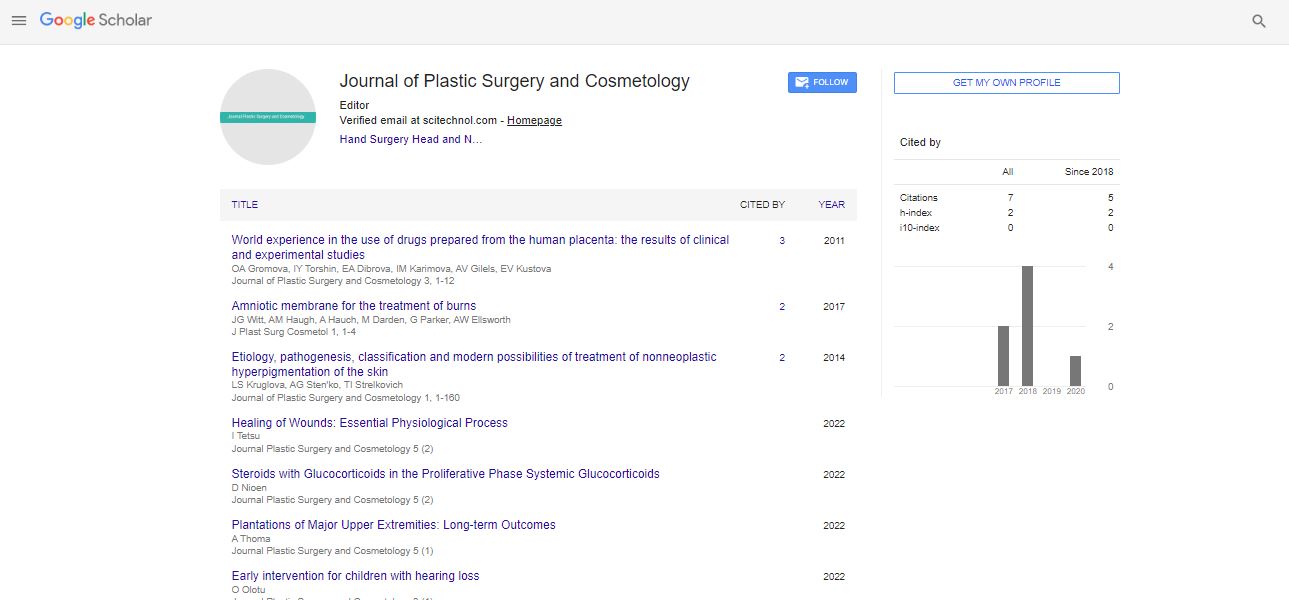Commentary, J Pls Sur Cos Vol: 12 Issue: 4
Navigating Ethical Challenges in Aesthetic Medicine: A Critical Examination of a Rapidly Evolving Field
María Sotiri*
1Department of Pharmacy, University of Patras, Patras, Greece
*Corresponding Author: María Sotiri,
Department of Pharmacy, University of
Patras, Patras, Greece
E-mail: Smaria_34675@gmail.com
Received date: 27 November, 2023, Manuscript No. JPSC-24-123944;
Editor assigned date: 29 November, 2023, Pre QC No. JPSC-24-123944 (PQ);
Reviewed date: 14 December, 2023, QC No. JPSC-24-12394;
Revised date: 21 December, 2023, Manuscript No. JPSC-24-123944 (R);
Published date: 28 December, 2023, DOI: 10.4172/JPSC.1000064
Citation: Sotiri M (2023) Navigating Ethical Challenges in Aesthetic Medicine: A Critical Examination of a Rapidly Evolving Field. J Pls Sur Cos 12:4.
Description
The field of aesthetic medicine has experienced rapid evolution, driven by technological advancements, changing societal norms, and an increasing demand for cosmetic enhancements. Amidst this transformation, ethical challenges have emerged, requiring careful consideration and examination. This essay explores the ethical dimensions of aesthetic medicine, addressing the challenges and considerations that practitioners, regulators, and society must navigate in this dynamic and evolving field. Ethical considerations in aesthetic medicine begin with the concept of informed consent. As patients seek various cosmetic procedures, practitioners must provide comprehensive information about the potential risks, benefits, and alternatives associated with each intervention. Ensuring that patients are fully informed empowers them to make autonomous decisions aligned with their values and expectations.
Aesthetic medicine often involves subjective outcomes, and managing patient expectations becomes a crucial ethical consideration. Practitioners must communicate realistic expectations regarding the results of procedures, acknowledging the limitations of interventions and potential variations in individual responses. Clear communication helps prevent dissatisfaction and fosters trust between patients and practitioners. Aesthetic medicine operates within a cultural and societal context that often places significant emphasis on physical appearance. Practitioners must navigate the ethical implications of providing cosmetic interventions in a culture that may perpetuate unrealistic beauty standards. Responsible practice involves promoting positive body image and mental well-being while respecting diverse perceptions of beauty.
Certain individuals may be more vulnerable to societal pressures or suffer from body dysmorphic disorders. Ethical practitioners must exercise caution in assessing the psychological well-being of patients seeking aesthetic interventions. The responsibility to decline procedures when they may exacerbate underlying mental health issues is a critical ethical consideration in protecting the welfare of vulnerable individuals.
The commercialization of aesthetic medicine introduces ethical dilemmas related to profit motivations. Practitioners must balance the financial aspects of their practice with the best interests of the patient. Unethical practices, such as aggressive marketing, upselling unnecessary procedures, or prioritizing profit over patient safety, undermine the integrity of aesthetic medicine and erode public trust.
The rapidly evolving nature of aesthetic medicine presents challenges for regulatory bodies. Ethical considerations include the need for clear guidelines and oversight to ensure that practitioners adhere to established standards. Regular updates to regulations and ongoing collaboration between industry professionals and regulatory agencies are essential to address emerging ethical concerns. The integration of cutting-edge technologies in aesthetic medicine raises ethical concerns related to the safety and efficacy of these innovations. Practitioners must critically evaluate the evidence supporting new technologies before incorporating them into practice. Rapid adoption without sufficient evidence poses risks to patient safety and may compromise ethical standards.
Ethical considerations extend to the training and competency of practitioners utilizing new technologies. The responsibility to stay informed about the latest advancements, pursue appropriate training, and adhere to evidence-based practices is paramount. Ensuring that practitioners possess the necessary skills and knowledge safeguards patient well-being and upholds ethical standards. Ethical considerations in aesthetic medicine include promoting inclusivity and addressing potential biases or discrimination. Practitioners must be attuned to the diverse needs of patients across various ethnicities, genders, and ages. Cultural competency, sensitivity, and the avoidance of perpetuating stereotypes are integral to ethical practice.
Ethical practitioners strive to provide accessible and equitable care to a diverse patient population. Considerations include affordability, cultural competence, and geographic accessibility. Efforts to reduce disparities in access to aesthetic interventions contribute to ethical practice and align with principles of justice and fairness. As aesthetic medicine evolves, ethical considerations become increasingly complex. Practitioners, regulators, and society at large must collaboratively address these challenges to ensure the responsible and ethical advancement of the field. Embracing principles of transparency, patient autonomy, and social responsibility will contribute to the establishment of ethical norms that prioritize patient well-being in the dynamic and rapidly evolving landscape of aesthetic medicine.
 Spanish
Spanish  Chinese
Chinese  Russian
Russian  German
German  French
French  Japanese
Japanese  Portuguese
Portuguese  Hindi
Hindi 